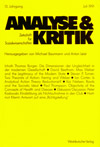ohne Titel

1981 (3) Issue 2
Editorial
Die Diskussionen über eine Theorie der gerechten Gesellschaft stehen mit im Zentrum der programmatischen Konzeption von ANALYSE & KRITIK. Das Ziel einer solchen Theorie muß es sein, Kriterien zu formulieren und zu begründen, um zwischen gerechten und ungerechten Institutionen einer Gesellschaft unterscheiden zu können. Neben der Aufstellung allgemeiner Prinzipien - dazu zählen z. B. das Utilitäts-, Differenz- und Anspruchsprinzip - muß eine Theorie der gerechten Gesellschaft, wenn sie sic...
Table of Contents
Title: Zur Kritik der libertären Eigentumskonzeption
Author: Peter Koller
Page: 137-154
Abstract: Nozick's entitlement theory of justice is, besides Rawls's theory, one of the most widely discussed and intellectually most attractive conceptions within the field of contemporary political philosophy. Nozick's theory uses Locke's conception of the state of nature and of natural rights, and tries, starting from this point of view, to deliver a comprehensive systematisation of libertarian political ideals. This essay deals mainly with Nozick's conception of property rights. The argument is put forward that the concept of exclusive and unrestrictable ownership of which Nozick makes use, doesn,t find any acceptable justification on the basis of his theory.
Title: Überlegungen zu einer dispositionalen Deutung des Andershandelnkönnens
Author: Björn Burkhardt
Page: 155-170
Abstract: The assertion "he could have done otherwise" represents a notorious problem in the science of penal law and in moral philosophy. Some philosophers have assumed that this statement is to be analysed as "he would have done otherwise if he had so chosen" (analysis view), thus believing to have found an interpretation which is compatible with determinism. It has been argued, however, that these two statements are not equivalent. The following article attempts to show that this objection is not far-reaching enough. At the same time the analysis view is considered to be of little help, as it presupposes the solution of the problems it claims to solve.
Title: Schutz und Gefährdung von Rechten durch die staatliche Kriminalstrafe
Author: Elke Kliemt / Hartmut Kliemt
Page: 171-193
Abstract: Utilitarianism has been widely accused of inadequately treating the problem of human rights. One main criticism has been, that it could not account for acceptable institutions of legal punishment. Though the utilitarian position seems to be untenable it contains some sound points - above all its consequentialist metaethics. The central weakness of "right-based" justifications of the criminal sanction on the other hand seems to be that they do not give due place to the consequences of alternative institutional settings. But it seems to be possible to establish a right-based and consequentialist moral theory of legal punishment leading to an acceptable practice of punishment - though not necessarily the one we are acquainted with.
Title: Recht, Strafrecht und Sozialmoral
Author: Klaus Lüderssen
Page: 194-223
Abstract: It is shown by means of four examples that the demarcation between law and morals has become problematical. The study of more recent developments in ethics and in law indicates that in both fields the relevance of discourse and consent has grown. Though both law and morals aim at agreement their degree of dependance on it differs. The definition of law and morals suggested in this article is based on this view. Legitimate law consists of norms, which besides fulfilling other conditions have attained a certain degree of consent. On the other hand one can only talk of social morals when a very high degree of consent has been reached. The consequences of this definition are explained by means of the examples presented at the beginning.
Title: Zur Abgrenzung von Recht und Moral. Kommentar zu K. Lüderssens "Recht, Strafrecht und Sozialmoral"
Author: Lothar Kuhlen
Page: 223-236
Abstract: Lüderssen's definition of legal and moral norms according to the varying degree of consent given to them is rejected. The definition proposed is not only imprecise, but also inadequate in substance as it is in contradiction with central and plausible aspects of our conception of morals. On the face of it the definition put forward is convincing only in the context of a "recognition-theory" of law. It is argued that this theory is not convincing either and moreover can manage without this definition.
Title: The Pareto Principle and Policy Analysis. A Response to Warren Samuels, "The Pareto Principle: Another View" (ANALYSE & KRITIK 1/81)
Author: Jürgen Backhaus
Page: 237-246
Abstract: Warren Samuels has suggested that the Pareto Principle, when being used in policy analysis, is (1) limited, (2) selective, and (3) displays a conservative bias. In contrast to this view, in this note it is argued that the Pareto Principle is much less limited than was initially perceived (e. g. by Pareto himself) or is generally believed to be the case, that it tends to emphasize inclusiveness instead of selectivity, and that it is more likely to have an innovative instead of a conservative bias.